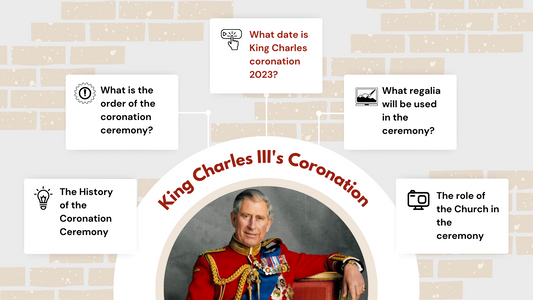As the world awaits the coronation of King Charles III, it's worth taking a look back at the history of the coronation ceremony and the traditions that have been upheld for centuries. From the regalia to the anointing oil, each aspect of the ceremony has a rich history that dates back to the earliest monarchs. In this blog post, we'll take a closer look at the coronation ceremony and what we can expect from King Charles III's coronation.

The History of the Coronation Ceremony
The coronation ceremony is one of the most important events in the life of a monarch. It marks the beginning of their reign and is steeped in history and tradition. In this blog post, we will take a look back at the history of the coronation ceremony and explore what to expect from King Charles III's coronation.
The origins of the coronation ceremony
The origins of the coronation ceremony can be traced back to the early Middle Ages. In England, the first recorded coronation took place in 973 AD, when King Edgar was crowned at Bath. The ceremony evolved over time, with each monarch adding their own unique elements to it.
The role of the Church in the ceremony
The coronation ceremony has always had a religious component, and the Church has played a central role in it. The monarch is anointed with holy oil and crowned by the Archbishop of Canterbury or another senior religious figure. This aspect of the ceremony symbolizes the monarch's divine right to rule and their obligation to govern justly and fairly.
Key elements of the ceremony, such as the anointing and crowning
The coronation ceremony involves several key elements, including the anointing and crowning of the monarch. During the anointing, the monarch is blessed with holy oil and anointed on the head, chest, and hands.
This is followed by the crowning, in which the monarch is crowned with the St. Edward's Crown, a symbol of the monarch's authority and power. Other important elements of the ceremony include the oath of allegiance, the presentation of the sword of state, and the enthronement of the monarch.
Coronations have been a significant part of British history for centuries, marking the ascension of a monarch to the throne and serving as a public display of power and authority. Throughout history, there have been many notable coronations of British monarchs that have left a lasting impact on the country's culture and traditions. Let's explore some of the most significant coronations of British monarchs throughout history.
King William the Conqueror's coronation in 1066:
King William the Conqueror was the first Norman King of England, who ascended the throne on Christmas Day in 1066. His coronation ceremony took place at Westminster Abbey, which became the traditional location for English coronations. William was crowned by the Archbishop of Canterbury and he took the coronation oath in English, despite speaking only French.
Queen Elizabeth I's coronation in 1559
Queen Elizabeth I's coronation ceremony took place on January 15, 1559, at Westminster Abbey. Elizabeth was crowned by the Bishop of Carlisle, and she wore a gown of cloth of gold and a crown set with precious stones. Her coronation was significant because she was the first English monarch to establish the Church of England, which replaced the Roman Catholic Church as the official religion of the country.
Queen Victoria's coronation in 1838
Queen Victoria's coronation took place on June 28, 1838, at Westminster Abbey. Victoria was crowned by the Archbishop of Canterbury, and she wore a white satin gown trimmed with lace, and a diamond-encrusted crown. Her coronation was significant because it marked the beginning of the Victorian era, which was characterized by industrial growth, scientific advancements, and social reforms.
Queen Elizabeth II's coronation in 1953
Queen Elizabeth II's coronation was held on June 2, 1953, at Westminster Abbey. Elizabeth was crowned by the Archbishop of Canterbury, and she wore a gown of white satin embroidered with gold and silver threads, and a diamond-encrusted crown. Her coronation was significant because it was the first to be broadcast on television, allowing millions of people around the world to witness the ceremony. It also marked the beginning of the modern era of the British monarchy.
Overall, these coronations are significant moments in British history, and they each have unique aspects that make them memorable.
What date is King Charles coronation 2023?
The coronation of King Charles III is set to take place on May 6, 2023, at Westminster Abbey in London. It is a historic location that has been the site of coronations for British monarchs since 1066.
What regalia will be used in the ceremony?
The coronation regalia is an important part of the ceremony and includes the crown, scepter, orb, and other ceremonial items. These items have a rich history and are often adorned with precious jewels and metals.
What is the order of the coronation ceremony?
The coronation ceremony is a complex and carefully choreographed event, with many different stages and rituals. The order of the ceremony typically includes a procession of dignitaries and members of the royal family, followed by an oath-taking by the new monarch.
If you're a fan of King Charles III and want to commemorate his coronation, don't miss out on our exclusive King Charles III collection. From bobble heads to mugs, plates to shopping bags, and bunting flags to other memorabilia, we have everything you need to celebrate this historic occasion in style.
Our collection features high-quality, unique items that make for great gifts or additions to your own personal collection. So, don't wait any longer to show your love and support for the new monarch. Shop our King Charles III collection today and find the perfect keepsake to treasure for years to come!
Conclusion:
The coronation of King Charles III is a historic event that will be watched by millions around the world. By understanding the rich history of the coronation ceremony and what to expect from King Charles III's coronation, we can appreciate the significance of this event and the traditions that have been upheld for centuries.


